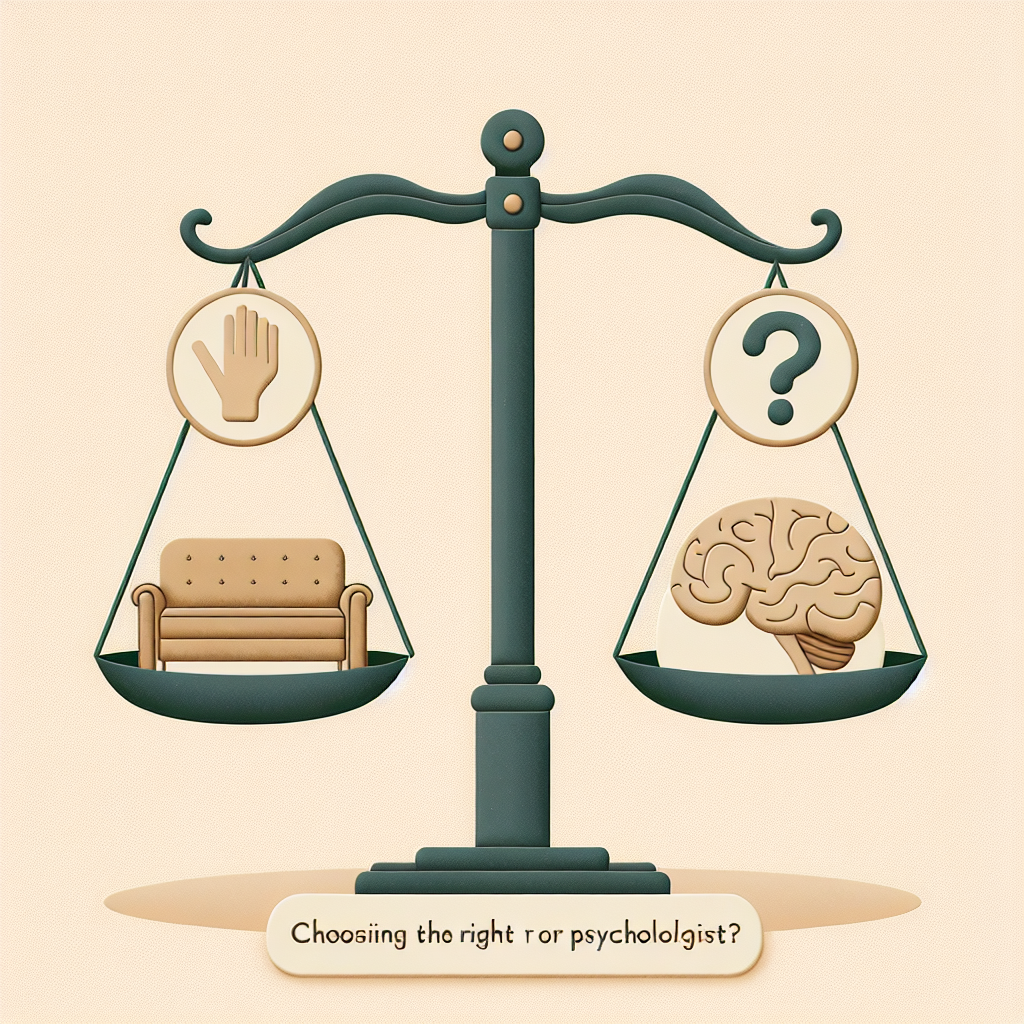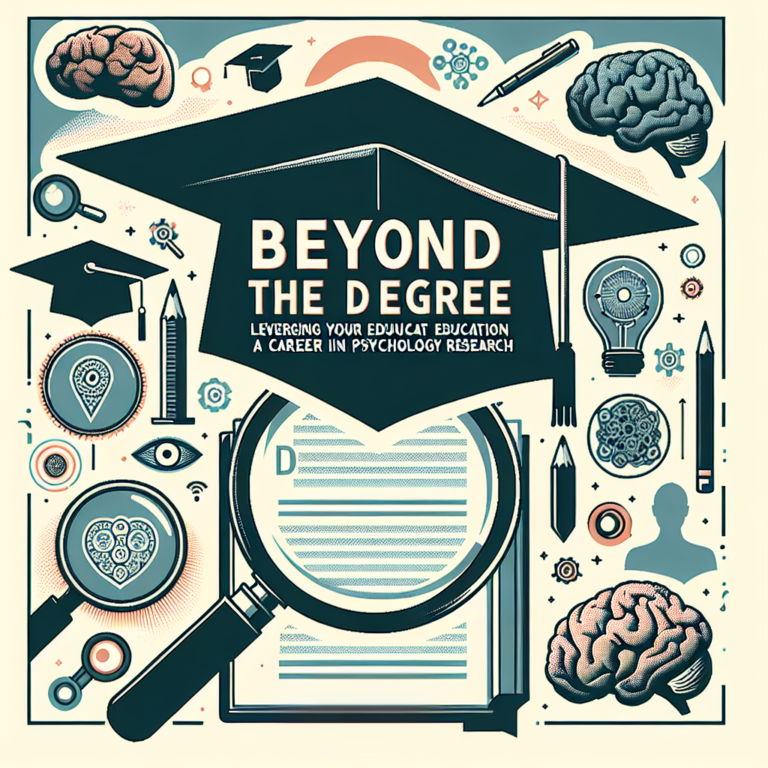
Choosing a mental health professional can feel overwhelming. With various titles and specialties in the field, navigating your options might raise questions: Should you seek help from a therapist or a psychologist? What’s the difference, and how will you know which is the right fit for you? In this essential guide on Choosing the Right Professional: Therapist or Psychologist?, we’ll break down those distinctions, explore real-world applications, and equip you with the knowledge to make an informed choice.
The Importance of Mental Health
Mental health issues affect millions of people daily, impacting their daily lives, relationships, and overall well-being. Reports from organizations like the World Health Organization indicate that 1 in 4 people will experience some form of mental health disorder in their lifetime. With such staggering statistics, understanding how to seek help becomes paramount. This guide will empower you with actionable insights so that you can navigate your mental health journey effectively.
Understanding the Basics: Therapist vs. Psychologist
What is a Therapist?
A "therapist" is a broad term that encompasses various mental health professionals. This includes:
- Licensed Professional Counselors (LPCs)
- Marriage and Family Therapists (MFTs)
- Clinical Social Workers (MSW)
- Licensed Mental Health Counselors (LMHCs)
Key Characteristics:
- Education: Therapists typically hold master’s degrees in counseling or social work.
- Focus: They often provide talk therapy, helping clients navigate emotions and behavior.
- Specialization: Some may focus on specific issues, such as marriage conflict, family dynamics, or trauma.
What is a Psychologist?
A psychologist is a trained professional specializing in the study of the human mind and behavior. They can provide therapy but often focus on psychological assessments and research.
Key Characteristics:
- Education: Psychologists hold doctoral degrees (Ph.D. or Psy.D.) and have extensive training in assessments.
- Focus: They may diagnose mental health disorders more formally than therapists and offer cognitive-behavioral therapy (CBT) and other modalities.
- Specialization: Psychologists often specialize in areas like clinical psychology, neuropsychology, or educational psychology.
When to Choose a Therapist
Understanding when to opt for a therapist is crucial. Here are some scenarios where seeking a therapist may be beneficial:
- Emotional Struggles: If you’re grappling with issues like anxiety, depression, or relationship problems, a therapist can help you work through those feelings.
- Life Transitions: Life changes, such as divorce or job loss, can create stress. A therapist can provide coping strategies.
- Family Dynamics: Engaging in family therapy can facilitate better communication and relationship repair.
Case Study: Liz’s Journey with a Therapist
Liz, a 34-year-old corporate employee, sought help after experiencing high anxiety due to job stress. She consulted with a licensed therapist who used mindfulness techniques and cognitive-behavioral strategies to help her manage her anxiety. Over six months, Liz felt less overwhelmed and regained control over her stress. This case exemplifies the value of therapy for managing day-to-day emotional struggles.
When to Choose a Psychologist
In certain cases, a psychologist may be the more appropriate choice. Here’s when to consider their expertise:
- Complex Disorders: If you are dealing with serious mental health issues such as PTSD, severe depression, or borderline personality disorder.
- Diagnosis: If you require a diagnosed assessment and testing for conditions like ADHD or learning disabilities, psychologists are equipped for this.
Case Study: Mark’s Assessment with a Psychologist
Mark, a college student, was struggling with attention and focus during his studies. After an initial consultation, he engaged with a psychologist who conducted various cognitive assessments and diagnosed him with ADHD. With a tailored treatment plan that included therapy and educational strategies, Mark improved both his grades and self-esteem. This case illustrates how psychologists can aid in uncovering underlying issues that require more than talk therapy.
Comparing Qualifications and Expertise
| Profession | Typical Qualifications | Main Focus | Common Techniques |
|---|---|---|---|
| Therapist | Master’s Degree | Talk therapy, behavior modification | CBT, mindfulness, EMDR |
| Psychologist | Doctoral Degree | Diagnosis, assessment, therapy | Psychotherapy, assessments |
This comparison table highlights the distinctions between these professionals and can serve as a handy reference when Choosing the Right Professional: Therapist or Psychologist?
The Importance of Compatibility
Regardless of your choice, the relationship between you and your mental health professional is fundamental. Compatibility can significantly affect the therapy’s effectiveness. Here are some tips to ensure you’re making the right choice:
- Initial Consultation: Many therapists and psychologists offer a free initial consultation. Use this opportunity to gauge comfort.
- Ask Questions: Don’t hesitate to ask about their experience, methodologies, and areas of expertise.
- Trust Your Instincts: Pay attention to how you feel after each session. If you don’t feel a connection, it might be worth exploring other options.
The Role of Specializations
It’s essential to align your needs with the therapist or psychologist’s specialization. Not everyone is a fit for every issue. Here’s how to spot the right expertise:
- Therapist Specializations: Marital issues, trauma recovery, adolescent counseling.
- Psychologist Specializations: Neuropsychology, cognitive assessments, research.
Common Misconceptions
Choosing the Right Professional: Therapist or Psychologist? often comes with accompanying misconceptions. Here are a few myths debunked:
- Myth: Therapists can’t diagnose.
While many therapists are trained to diagnose, they may not be as proficient in complex assessments.
- Myth: Psychologists can’t offer therapy.
This is false; psychologists often provide therapy and can diagnose conditions requiring deeper engagement.
- Myth: All mental health professionals are the same.
This couldn’t be further from the truth. Each specialty offers unique approaches, techniques, and qualifications.
Actionable Insights for Your Journey
- Know Your Needs: Understand what you’re seeking from therapy—support with daily life struggles or more complex psychological assessments.
- Do Your Homework: Research your options thoroughly and reflect on what fits your lifestyle and values.
- Be Open: Stay receptive to changing professionals if the first choice doesn’t resonate; finding the right fit can take time.
Conclusion
Choosing the right professional is an essential step in your mental health journey. By understanding the differences between therapists and psychologists, you empower yourself to make informed decisions. Remember, successful therapy hinges on compatibility, skills, and understanding your individual needs.
As you embark on this journey, hold onto this key insight: your mental health matters. Seek the support you need, and know that you have the strength to navigate your unique path towards healing.
Frequently Asked Questions
1. What is the primary difference between a therapist and a psychologist?
The main difference lies in their education and focus areas. Therapists typically hold master’s degrees and provide supportive counseling, while psychologists hold doctoral degrees and often conduct assessments.
2. Can I see both a therapist and a psychologist?
Yes, many people choose to work with both types of professionals simultaneously, addressing different areas of their mental health.
3. How do I determine which professional is right for me?
Consider your needs: if you’re facing significant emotional issues, a therapist may be beneficial; if you need diagnosis or assessment, a psychologist might be better.
4. Are therapy sessions covered by insurance?
Insurance policies vary, but many do cover therapy sessions with licensed professionals. Always check your coverage options beforehand.
5. What if I don’t feel comfortable with my therapist or psychologist?
It’s essential to feel comfortable with your chosen professional. If you don’t connect, don’t hesitate to explore other options. Your mental well-being is the priority.
By understanding the distinctions and implications of Choosing the Right Professional: Therapist or Psychologist?, you can unlock the door to better mental health, tailoring your journey to your aspirations and challenges.

















